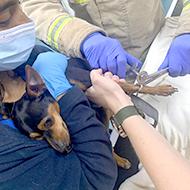
Lola trapped her leg through the buckle of her car harness.
A three-year-old miniature pinscher from Wolstanton had to be cut free by the fire service when she accidentally got her leg stuck in the buckle of her car seat harness.
Leighanne Harrison, explained how her dog Lola came to be in that situation: “Lola gets very excited in the car and likes to stand up on the seat being nosey and looking out of the window, so we always use a safety harness, attached to the seatbelt, to keep her safe and secure.
“However, when we were taking it off, she somehow managed to put her leg through the buckle and it quickly became completely stuck.
“We knew we needed to get some help and decided to call White Cross Vets who we have been with since Lola was a puppy.”
The team at White Cross Vets tried to help Lola by lubricating the buckle and shaving the hair around it to make more space and slide her leg out, but it became apparent that none of the tactics the team was using would work.
Pulling Lola's leg could break the fragile bones in her leg, and the team didn't want to risk that, so they called the fire service, who quickly arrived to save the day.
Holly Ravenhall, clinic director at White Cross Vets, said: “This was a very unusual case and something we’d never seen before, but dogs have a habit of surprising us and Lola is no exception!
“In the end, it became clear that it needed to be cut off and that’s when we decided to call the fire service’s non-emergency number. They were fantastic and promptly turned up in a fire engine, with all the kit.
“We initially thought she’d have to go under a general anaesthetic for the procedure, but they had a tool that was perfect for the job, and they cut it off in a matter of minutes, with Lola staying calm throughout, much to everyone’s relief.”
Leighanne, Lola's owner, added: “Thankfully Lola wasn’t traumatised by the incident and still loves her car journeys, but we now hold her paws when we’re taking the harness off to make sure it never happens again!”
Image (C) White Cross Vets



 The latest
The latest